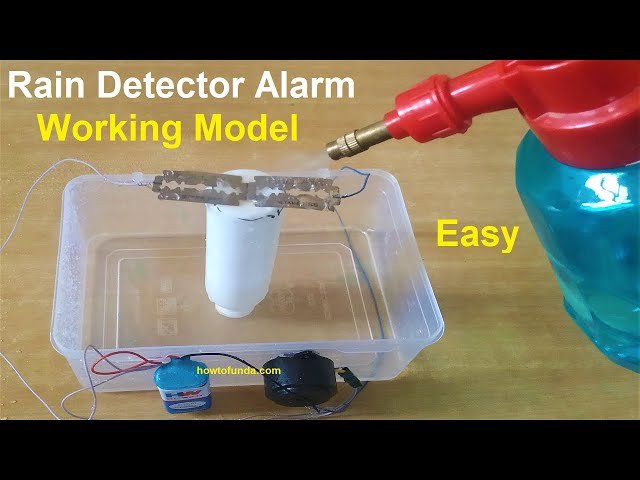1. What is a rain alarm?
- Answer: A rain alarm is a device that detects the presence of rain and triggers an alert or alarm.

2. How does a rain alarm work?
- Answer: Rain alarms typically use sensors that can detect moisture or raindrops. When rain is detected, the sensor sends a signal triggering the alarm.
3. What are the common types of rain sensors used in rain alarms?
- Answer: Common rain sensors include hygroscopic sensors, which absorb moisture, and conductivity sensors, which detect changes in electrical conductivity due to rain.
4. Why is a rain alarm useful?
- Answer: A rain alarm is useful to alert individuals about the onset of rain, allowing them to take necessary precautions such as covering outdoor items or seeking shelter.
5. Can rain alarms be used for agricultural purposes?
- Answer: Yes, rain alarms can be employed in agriculture to inform farmers about rainfall, helping them manage irrigation and other farming activities more efficiently.
6. How can rain alarms contribute to water conservation?
- Answer: Rain alarms can help in water conservation by preventing unnecessary irrigation when natural rainfall is sufficient, reducing water usage.
7. Are rain alarms commonly used in weather stations?
- Answer: Yes, rain sensors and alarms are often components of weather stations, providing real-time data on precipitation.
8. Can rain alarms be integrated with smart home systems?
- Answer: Yes, modern rain alarms can be connected to smart home systems, allowing users to receive alerts on their smartphones and automate actions based on rain detection.
9. What are the limitations of rain alarms?
- Answer: Rain alarms may have limitations in accurately predicting the amount of rainfall and may not be suitable for detecting light drizzles.
10. How can students build a simple rain alarm for a science project? – Answer: Students can build a simple rain alarm using a conductivity sensor, a microcontroller like Arduino, and a buzzer. When rain is detected, the sensor triggers the buzzer to produce an alert sound.
11. Can rain alarms help prevent flooding in urban areas? – Answer: Rain alarms alone may not prevent flooding, but they can be part of a larger system to monitor rainfall and contribute to flood forecasting and management.
12. What other applications can rain alarms have besides personal use? – Answer: Rain alarms can be used in various applications, including agriculture, meteorology, construction sites, and environmental monitoring.
13. How does the sensitivity of a rain sensor impact its performance? – Answer: The sensitivity of a rain sensor determines how quickly and accurately it can detect the onset of rain. Higher sensitivity allows for more rapid response.
14. Are there portable rain alarms available for outdoor activities? – Answer: Yes, there are portable and battery-powered rain alarms designed for outdoor activities, providing users with real-time alerts about changing weather conditions.
15. Can rain alarms be used in greenhouses to optimize watering schedules? – Answer: Yes, rain alarms can be utilized in greenhouses to optimize watering schedules by ensuring that plants receive adequate natural rainfall before additional irrigation is applied.

